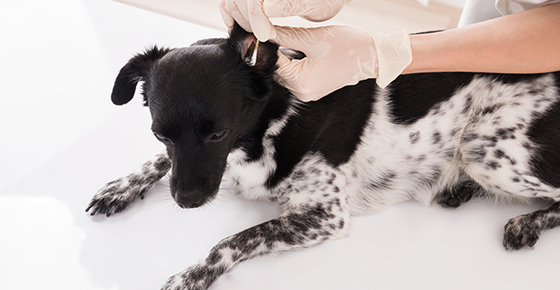
Symptoms of ear disease are shaking the head, scratching at the ears, discharge from the ear canal, odor from the ear, or redness of the ear flap or entrance to the ear canal. Your pet may be tilting their head to one side although it's important to point out that there are causes for this other than ear disease. The color and consistency of discharge may vary from yellow liquid to black wax, but the color does not indicate one particular cause.
Causes of Ear Problems for Pets
The causes of ear disorders are due to infection, allergy, foreign bodies, or tumors. Your veterinarian will examine the ear canal with an otoscope which allows the long canal to be inspected along its entire length. The exam will also help your veterinarian determine if the eardrum is intact. This may require sedation or anesthesia if the ear is very painful or if the pet is not cooperative. A sample of the discharge will be examined under a microscope for any organisms. This information will help your veterinarian in developing an appropriate treatment plan.
Infections of the ear can be due to yeast, bacteria, or ear mites. Yeast infections are by far the most common, accounting for an estimated 75% of cases in dogs. Bacterial infections cause about 20% of ear infections, and ear mites cause about 5% (or less) of cases in dogs. Bacteria resistant to antibiotics are an increasing cause of ear infections. This is diagnosed with a culture and sensitivity by a laboratory. Some bacterial infections can even perforate the eardrum.
Allergies are a very common cause of ear problems, in fact, many of the yeast infections are secondary to an underlying allergy. If there are recurring ear symptoms, allergy is almost certainly the cause. Environmental allergens such as pollen, molds, and house dust mites are frequent causes of allergy. Food allergy is also a common cause of ear problems. A pet is not allergic to a brand of food, but is allergic to one or more food ingredients. A food trial is the only method to determine if a food allergy is an etiology. There is no reliable blood or intradermal skin test for food allergy. Consequently, flea allergy is generally not a cause of ear abnormalities.
Occasionally a foreign body will make its way into the ear canal and cause irritation or even perforate the eardrum. Pieces of plants, especially seedpods called foxtails, are a common foreign body that can cause ear problems. Anesthesia may be needed to remove the object. Tumors, which are even more rare, may develop in the ear canal and cause a blockage. Surgery may be needed to remove the mass and pathology should be performed to determine if it is benign or malignant.
Treatment for Your Pet
Treatment of ear problems will depend on the cause of the disease, for example, a bacterial infection is treated differently than a yeast infection. A foreign body needs removal while ear mites need a parasite treatment. In general, treatment often involves oral medicine, topical medicine, and ear cleansers. It is also important to know whether the eardrum is intact, as many topical medications can't be used if there is a ruptured eardrum. In more advanced cases surgery may be the preferred method of treatment.
Ear problems are a malady your veterinarian sees on a regular basis. Most are healed with routine treatment but some cases can be more challenging. It is important to have a thorough exam, appropriate treatment and a follow-up plan to check on progress and ensure complete recovery. Many "repeat" infections are cases that never truly healed completely. Your veterinarian is your pet's best friend when it comes to ear problems so don't hesitate to call with your questions or make an appointment if you are concerned that your pet may be experiencing ear problems.
